Commercial Lead-Based Paint Inspection and Risk Assessment
Lead-based paint inspections are crucial to maintain the safety and integrity of your business. Commercial properties, including multifamily apartment buildings, office complexes, schools and retail spaces, are subject to lead-based paint regulations to protect occupants and visitors from exposure to lead hazards.
Lead exposure is an all-too-common occurrence that can have a variety of sources. While lead paint is perhaps the most well-known source of lead exposure, lead is present in soil, drinking water, dust and certain products that can easily enter your commercial property and cause health problems.
It is important to be aware of potential risks so you can safeguard your property and the people who work and live there—schedule a lead inspection with us!
Call 1-800-241-0133 to schedule a commercial lead inspection in your area!
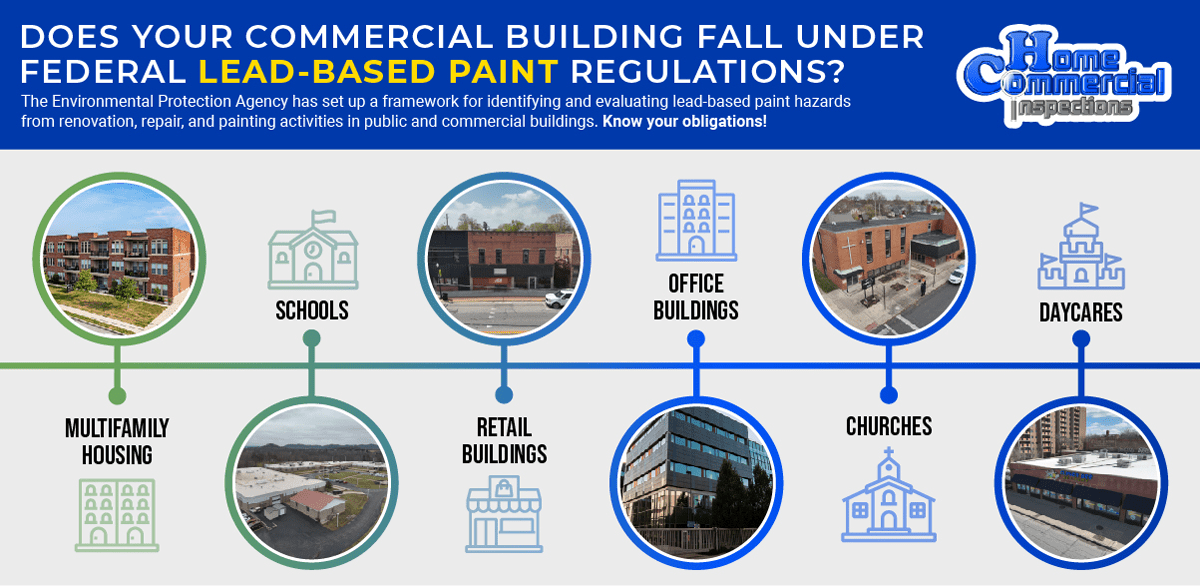
Lead Paint Risks in Multifamily Properties—Guidance for Landlords
Landlords have a duty to provide safe housing for their tenants.
The federal law on lead disclosure, which applies to homes built before 1978, requires landlords or sellers to reveal any known lead paint or hazards, including high lead levels in dust or soil. They must also provide a lead warning, an information pamphlet and a disclosure form. Tenants or buyers can cancel the lease if they’re not satisfied with the lead conditions.
Under the Housing Quality Standards (HQS), landlords must fulfill certain performance requirements and acceptability criteria that come under the Lead-Based Paint Poisoning Prevention Act (42 U.S.C. 4821-4846) and the Residential Lead-Based Paint Hazard Reduction Act of 1992 (42 U.S.C. 4851-4856).
The best option is to have a lead risk assessment performed by Home & Commercial Inspections. One of our professional inspectors will examine and test your property for lead contamination in the paint, dust and soil and provide a detailed report on the findings.
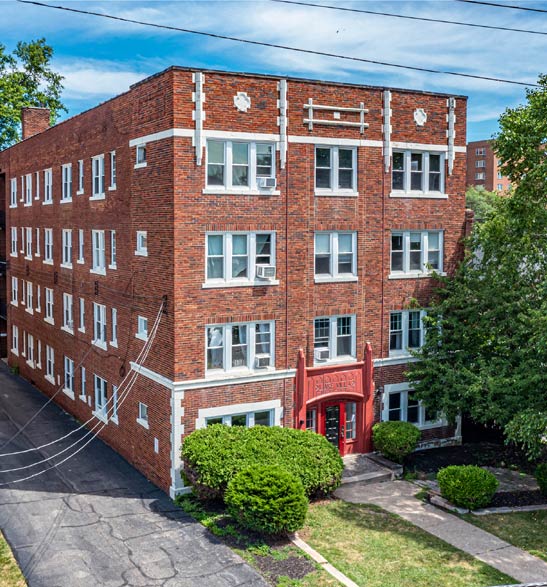
Multifamily Property Lead Inspection
To help landlords resolve issues, the US Department of Housing and Urban Development (HUD) will provide grants to remove dangerous lead-based paint from lower-income homes. HUD’s Office of Lead Hazard Control and Multifamily Property Lead Inspection
Healthy Homes (OLHCHH) pays state and local governments to create cost-effective lead-based paint risk reduction strategies. Applicants can get up to $9,300 for lead control and up to $2,100 to address hazards in tenant or owner-occupied units.
If you own a multifamily apartment building in Columbus, CGI (through the Columbus Metropolitan Housing Authority) will reimburse you $150 for lead dust wipe tests. Dayton and Cincinnati also have HUD-funded voucher programs for landlords to test for lead-based paint.
Home & Commercial Inspections will undertake thorough lead paint inspections for all HUD programs. Call 1-800-241-0133 to schedule a commercial lead inspection in your multifamily housing property!
Lead Paint Risks in Schools

Lead in Schools’ Drinking Water
Universities, schools and childcare facilities should also test drinking water for lead contamination and take necessary measures to stop the problem. Home & Commercial Inspections will undertake thorough tests of water, soil and paint to protect children, whether in childcare, at school, or at university.
Early childhood, K-12 and university administrators have a duty to test for lead in their facilities. Partner with Home & Commercial Inspections to ensure your environment is safe for your students.
Call 1-800-241-0133 to schedule a commercial lead inspection in your school.
A 2021 study published in JAMA Pediatrics says Ohio children have lead levels in their blood that are more than double the national average.
According to the Ohio Department of Health’s statistics from 2022, more than 200 children in the region had elevated lead levels in their bodies above 5 micrograms per deciliter. Health experts say there is no safe limit of lead exposure for children.
Lead exposure can be life-threatening and cause severe health issues, affecting the brain, heart, bones, kidneys and nervous system, causing developmental delays, learning disabilities and behavioral problems.
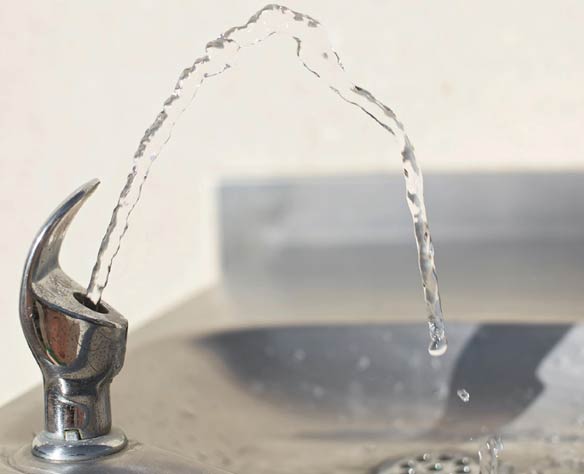
Lead in School Drinking Water
Lead Dust in the Workplace
Deteriorating lead paint can contaminate your business and poison the people working there. If you are removing paint, renovating, or doing moisture repair that disrupts painted surfaces, you and your staff may be exposed to dangerous lead paint dust and paint chips.
Before doing any restoration or building work, get in touch with Home & Commercial Inspections to thoroughly check the site.
The Environmental Protection Agency has set up a framework for identifying and evaluating lead-based paint hazards from renovation, repair, and painting activities in public and commercial buildings.
If you are a commercial property owner, Home & Commercial Inspections can advise on lead poisoning prevention and safe maintenance practices for your workplace and help address issues with a thorough inspection.
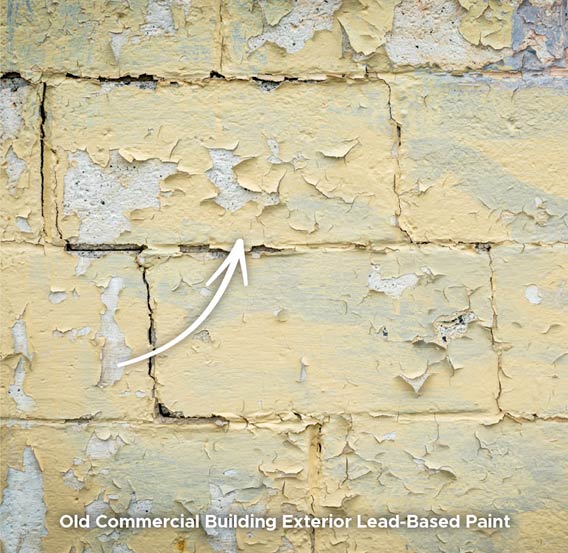
Old Commercial Building Exterior Lead-Based Paint
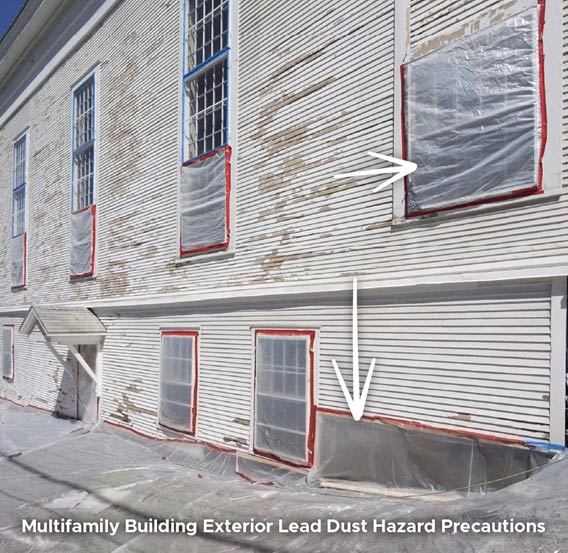
Multifamily Building Exterior Lead Dust Hazard Precautions
Lead Paint in Shopping Centers
Lead paint poisoning is a significant concern in Ohio’s shopping centers, given the prevalence of older buildings in the state. Deteriorating paint can create hazardous lead dust and paint chips, especially if commercial business owners are doing renovations or repairs.
The high foot traffic in shopping centers means there’s a greater chance of lead dust spreading and being breathed in by shoppers, and young children are especially at risk because they put their fingers in their mouths after coming into contact with contaminated surfaces.
Regular inspections, maintenance and prompt remediation are crucial to keeping your shoppers and employees safe.
Call 1-800-241-0133 now to schedule a commercial lead inspection of your commercial property.
What Are the Differences Between a Risk Assessment and a Lead Inspection?
A lead inspection is generally the first step in determining whether your commercial property contains lead. The main goal is to determine whether lead is in or around the property by testing dust and soil samples. This process is conducted by a professional lead inspector and involves taking surface samples from the property to send for laboratory testing.
When you opt for a risk assessment, you will receive a more thorough picture of the sources of lead in the building and just how concentrated levels are in all locations. Risk assessment also involves generating a detailed report and making specific recommendations. In some cases, an inspector may recommend abatement, which involves the complete removal of lead-contaminated paints, pipes, products and soil. In less severe cases, exposure can be minimized by a series of smaller steps.
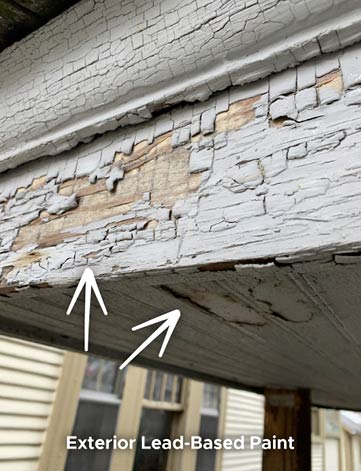
Exterior Lead-Based Paint
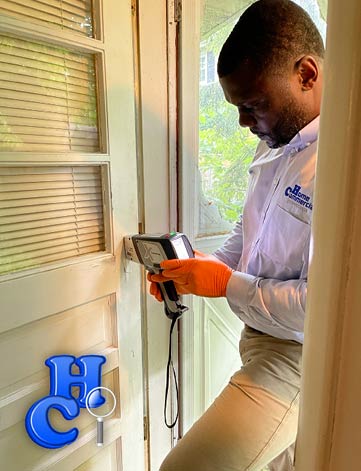
Lead-Based Paint Inspection
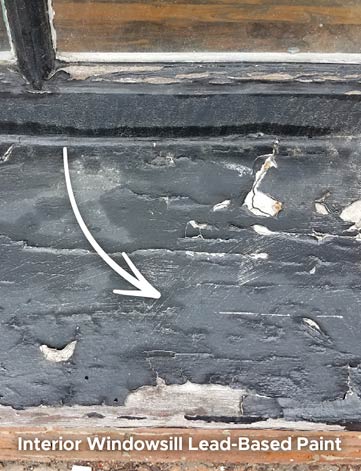
Interior Windowsill Lead-Based Paint
